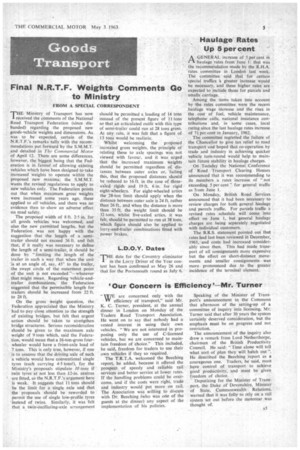Haulage Rate's . Up 5 per cent .
Page 7

If you've noticed an error in this article please click here to report it so we can fix it.
AGENERAL increase of 5 per cent in haulage rates fromlune 1: that was the recommendation made by the •R.H.A. rates committee in . London last week. The committee said that for certain special traffics 'a greater increase would be necessary, and these higher rates are expected to include those for parcels and smalls carriage.
Among the items taken into account by the. rates committee were the recent haulage wage increase and the rises in the cost of fuel, vehicle maintenance, telephone calls, national insurance contributions and, in some cases, local rating since the last haulage rates increase of 71 per centin January, 1961 The committee regretted the failure of the Chancellor to give tax relief to road transport and hoped that co-operation by trade and industry in achieving quicker vehicle turn-round would help to maintain future stability in haulage charges.
On Tuesday the National Conference of Road Transport Clearing Houses announced that it was recommending to its members a rates increase of "not exceeding 5 percent" for general traffic as from June 1.
On Monday, British Road Services announced that it had been necessaryto review charges for both general haulage and parcels traffic. For parcels traffic a revised rates schedule will come into effect on June 1, but general haulage charges are being separately negotiated with individual customers.
The B.R.S. statement pointed out that . rates had last been reviewed in December, 1961, and costs had increased .considerably since then. This had made transport of all consignments more expensive but the effect on short-distance movements and smaller consignments was more pronounced due to the greater incidence of the terminal element.




















































































































































































































































